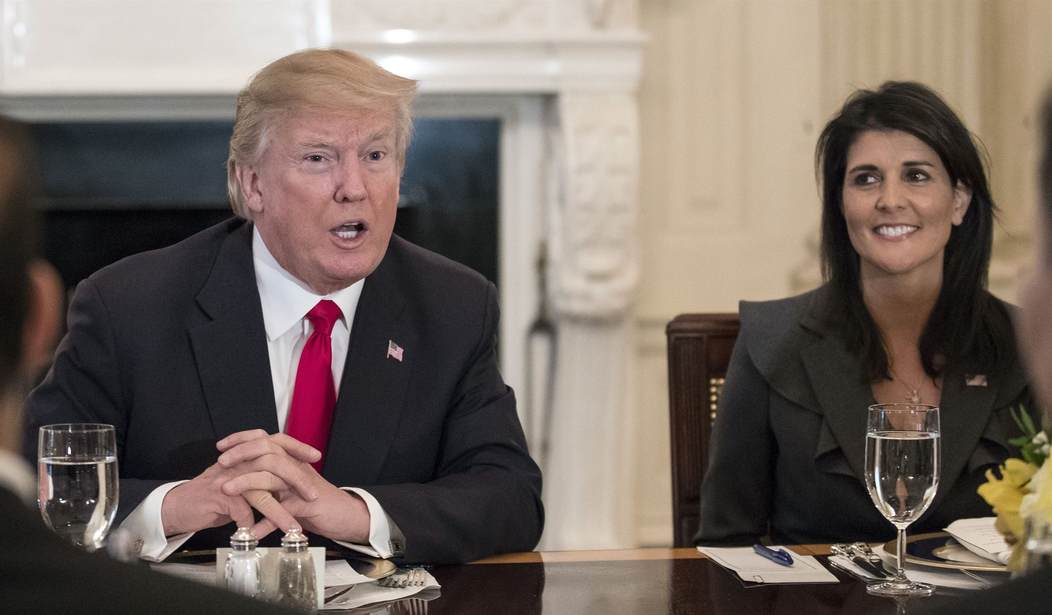President Trump’s first State of the Union speech made it evident that his “America First” foreign policy will eschew diplomacy, multilateralism, free trade, and protection of refugees and migrants. This is why now, more than ever, those within the broader liberty movement should support U.S. involvement in the U.N. and other multinational institutions.
The U.S. has a pivotal role in this as a permanent Security Council member, and wields great power in promoting American values on the global stage. As of 2016, Pew research shows that 64 percent of Americans have a favorable view of the UN, whereas 29 percent have an unfavorable one. In terms of actual support of active U.S. involvement within the UN, a 2017 poll by the the non-partisan Better World Campaign, which works to strengthen US engagement inside the UN, shows that 88 percent of Americans support an active role of the U.S. within the UN to solve difficult global challenges.
First, let's dispel the notion that the UN is a perfect system, or that the U.S. will agree to support every initiative within the organization. It is by no means a zero sum game, and is, in fact, the exact opposite. If anything we should use our involvement with the UN to promote American values, democracy, the rule of law, and human rights. There’s no better example to show that off in the global hub that is New York City where the U.N. headquarters is located.
It’s undeniable that there are a number of problematic issues internally within the UN on things such as accountability, corruption, and questionable membership of countries in certain committees. A lack of U.S. involvement, however, does not help for increased multilateralism and institutional reform; rather, it will greatly exacerbate it and leaves a gaping void of U.S. leadership in its stead.
Recommended
Save some small to medium conflicts there has been no world war since World War II, and most importantly no nuclear war since before the creation of the UN. Through the height of Cold War and the ever looming threats of another World War the world still had a place to come to the table to resolve its issues.
The same holds true today with the modern political landscape. Involvement in the UN also gives the U.S. an opportunity for backdoor diplomatic meetings with our adversaries mainly Iran and North Korea. Even if these meetings don’t produce favorable results, it still gives all parties an opportunity to seek alternatives to escalation, sanctions, and worse case scenarios such as another world war.
To understand the present we must also understand a little bit of the past. Ever since its founding, the UN and its predecessor, the League of Nations (LoN), have both largely drawn scorn and repudiation from those critics skeptical of U.S. involvement in global institutions. The most notable early example of this is H.L. Mencken, who is generally seen as the leading anti-war intellectual of the 1920s and was adamantly opposed to the U.S. joining the League of Nations.
These strains of skepticism have carried into modern politics as well, particularly from former Congressman Ron Paul who has time and time again called for the U.S. to withdraw from the UN. Just recently, Alabama Congressman Mike Rogers, along with cosponsor Thomas Massie, introduced the “American Sovereignty Restoration Act of 2017,” which calls for the complete withdrawal of the U.S. from the UN. While this initiative inevitably failed, it encapsulates well the skepticism with which many conservatives and libertarians continue to see U.S. engagement within the UN.
During the postwar San Francisco Conference, the UN. was created and fully ratified on October 24, 1945. In the coming year, the remaining operating parts of the LoN was transferred to the United Nations. Its founding documents were the UN Charter followed by the Universal Declaration of Human Rights (UDHR). Both of these documents have libertarian themes throughout, and they’re based on certain inalienable human rights and the rule of law.
These values in many ways are antithetical to the Trump administration’s protectionist and anti-immigrant worldview. Contrary to conventional wisdom, there has been a lot of widespread support (albeit not universal) of free trade within the UN and in particular the World Trade Organization (WTO). Just recently, U.N. Secretary General Antonio Guterres stressed the importance of free trade and industrialization in on the African Continent in his announcement on the annual Africa Industrialization Day. Furthermore, the very purpose of the WTO is to promote reducing trade barriers and tariffs in order to promote global free trade.
We must ask ourselves what does the U.S. pulling out of the most important multilateral institution in the world do for global stability? It does little and ultimately undermines the U.S.’s role in the world, and leaves that gaping void to be filled by the likes of China and Russia. We should actively promote democratic values, the rule of law, peace, free trade, and immigration, but we should do so within these various international bodies where the world comes together.

























Join the conversation as a VIP Member